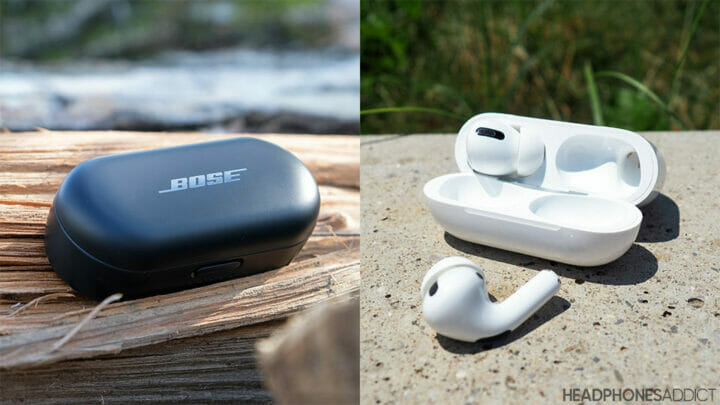How do Bose Sport Earbuds compare to Beats PowerBeats Pro?
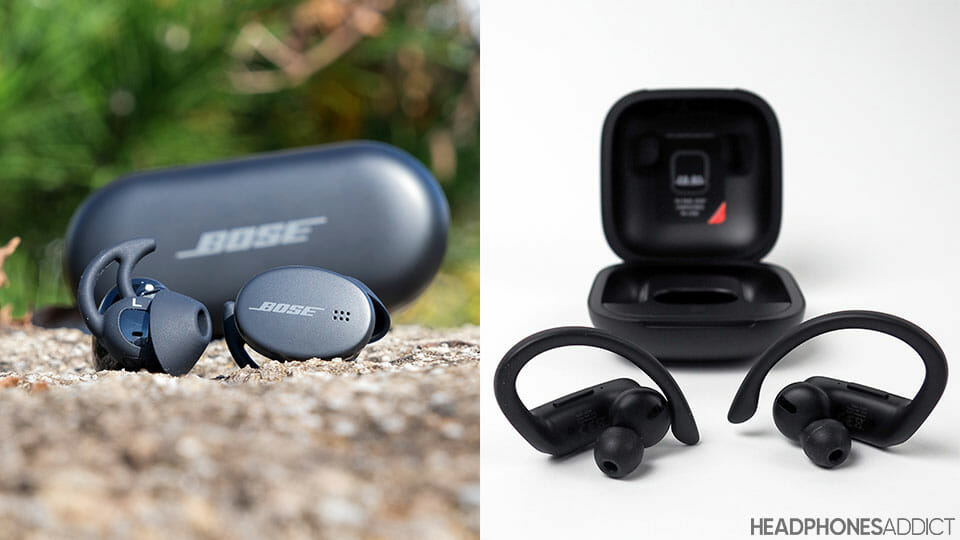
You’re looking at two excellent true wireless earbuds for sports. You can’t go wrong with either of these, although there are some differences:
Bose Sport Earbuds have ear fins, while the other has ear hooks. That’s why Beats PowerBeats Pro are more stable during movement. That’s not to say that Bose Sport Earbuds are not stable. Even when you aggressively shake your head, ear fins keep the buds in place well.
PowerBeats Pro battery lasts more than twice as long. They provide you with 11 hours of continuous runtime per single charge. Bose earbuds last only around 5 hours which is rather low for their price.
But Bose Sport buds are more comfortable after extended use. The PowerBeats Pro ear hooks tend to rub against your skin which can be irritating.
Both are sweatproof with an IPX4 water protection rating. You can soak them in sweat but don’t put them under tap water.
For more details check the rest of the comparison below.
Quick Comparison
Both models:
- Overall excellent stability for working out
- Punchy bass with good extension
- Support for SBC and AAC
- Ability to connect with multiple devices (multipoint)
- IPX4 rating (sweatproof)
Bose Sport Earbuds
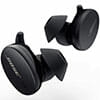
Better comfort with great stability
Average isolation due to shallow fit
Support for a newer, more stable Bluetooth 5.1
5h / charge + 10h in case
IPX4 – sweatproof
Touch-sensitive controls
Smoother midrange and treble, with controlled bass
Beats PowerBeats Pro
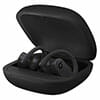
Superior stability with ear hooks
Slightly better passive isolation
H1 chip for better connectivity with Apple’s devices
11h / charge + 24h in case
IPX4 – sweatproof
More intuitive physical controls
Distinctly V-shaped sound (boosted bass and treble)
Specifications
| Bose Sport Earbuds | Beats PowerBeats Pro | |
| Type: | In-ear | In-ear |
| Connection: | Wireless | Wireless |
| Back-design: | Closed-back | Closed-back |
| Driver size: | n/a | 12mm |
| Frequency range: | n/a | n/a |
| Impedance: | n/a | n/a |
| Weight: | 12g both buds | 22g both buds |
| Cable length: | 30cm | n/a |
| Microphone & controls: | Built-in | Built-in |
| Water-protection: | IPX4 (sweatproof) | IPX4 (sweatproof) |
| Bluetooth: | version 5.1 | version 5.0 + H1 chip |
| Battery life: | 5h per charge | 11h per charge |
| Charging time: | 2h full charge – 15min for 2h | 1h full charge – 5min for 1.5h |
| Active noise-cancellation: | No | No |
| Charging cable: | USB-C to USB-A | Lightning to USB-A |
| Bluetooth codecs: | SBC, AAC | SBC, AAC |
| Wireless range: | 30ft (9m) | 33ft (10m) |
| Type: | 4 built-in mics | Built-in mic |
| Mic design: | n/a | n/a |
| Mutable: | No | No |
What’s in the Box?
Bose Sport Earbuds

Beats PowerBeats Pro
With packaging you’re getting:
- True wireless earbuds
- Charging case
- User manual
- Charging cable: PowerBeats Pro: Lightning to USB-A; Sport Earbuds: USB-C to USB-A
- Beats PowerBeats Pro: 4 pairs of silicone tips vs. Bose Sport Earbuds: 3 pairs of silicone ear gels (ear tip/fin combo)
Comfort & Fit
Beats PowerBeats Pro offer impressive stability while you get superior comfort with Bose Sport Earbuds. However, we think the latter are overall better in this category.
Ear hooks are excellent when it comes to keeping earbuds in their place. Because they grab your ears like glue, they’re perfect for all kinds of indoor and outdoor sports activities.
Sadly, we can’t praise the comfort. After 30 minutes or so, the earbud’s housing starts to irritate the ears. Gradually, the irritation becomes more and more apparent, which makes you want to take a break.
Fortunately, Bose Sport Earbuds don’t cause the same problems. While the stability isn’t as secure as with the Beats, you can still use them for a run or gym. You maybe have to readjust them every once a while, but they usually stay secure.
Comfort is also excellent since you barely feel them in your ears. Earbuds use ear gels: a combination of ear tip and fin. The tip is much bigger than the ear canal, which is why it rests right in front and doesn’t go too deep. That way, you don’t feel any pressure.
Therefore, Bose Sport Earbuds are an overall better deal in this category.
Noise Isolation
While both earbuds have an in-ear design, PowerBeats Pro actually go inside the ear canal, sealing off more noise than Sport Earbuds.
The most significant difference here is that Beats PowerBeats Pro use ear tips that go inside your ear canal. That means that they can seal off the environmental noise better than Bose. You can even increase the level of isolation if you buy third-party foam tips.

On the other hand, Bose’s tips only hang in front of the canal. They’re still usable for outdoor use, but you will have to raise the volume by a notch if you work out near a busy road.
None of them offer active noise cancelling nor ambient aware features. Overall, Beats are a slightly better option here.
Bluetooth
Excellent connection stability and range on both ends. The difference is that Beats work better with Apple devices, while Bose are futureproof with Bluetooth 5.1.
Beats are using Bluetooth 5.0 and Apple’s H1 chip for a quicker pairing process and stability between Apple devices. In our test, we experienced some stutter even when our smartphone was in our pocket.
In contrast, we had no issues with Bose Sport Earbuds. They use Bluetooth 5.1, which is supposedly much more stable, but with the same coverage and transfer speeds. Pairing is fast, although connecting them with their app can be a bit frustrating.
As mentioned, both earbuds provide a reliable connection that can pass 2 brick walls. After that, both start to stutter and become unlistenable. The latter is typical with all true wireless earbuds.
Both earbuds also support multipoint, meaning you can connect them to multiple devices and skip between them when needed.
Neither of them support both earbuds for mono listening. Also, both support only SBC and AAC Bluetooth codecs. That’s fine since you get no video lag issues and good sound quality.
Battery
PowerBeats Pro have one of the beefiest batteries per single charge, giving you around 11 hours of playtime (even though they advertise 9 hours). On the other hand, Bose can only last for 5 hours, with the charging case offering similarly poor results.
In our test, we were surprised to see PowerBeats Pro last much longer than advertised. Beats promises 9 hours, but we got 11 out of them. That is still one of the best battery performance on the market, giving you almost a full day of use.

Great results continue with the charging case, which gives you 24 hours of additional playtime. While thats similar compared to some other true wireless earbuds on the market, it’s still significantly more than what Bose offers.
Speaking about Bose, Sport Earbuds can stay alive for around 5 hours on a single charge. That’s not that bad on its own since they can last you through a decent workout session. But it’s still miles behind the PowerBeats Pro.
Their charging case is also a bit low on juice, giving you merely 10 hours of extra runtime, despite having a somewhat chunky size.
Both earbuds support fast charging:
- You can add 1.5 hours in just 5 minutes to the PowerBeats Pro.
- Get 2 hours of battery life for a 15-minute charge on Sport Earbuds.
Durability
Both earbuds are made from quality plastic and come with the same IPX4 protection. Bose Sport Earbuds do come with a slightly more robust case, whereas the earbud’s housing appears more solid on PowerBeats Pro.
You will find hard plastic construction on both models, with a slight difference in Beats since they also have flexible ear hooks. Both feel reasonably robust in hand, but we think Pro’s could survive a couple more accidental drops.
You can use both earbuds for working out. They come with an IPX4 rating, which makes them sweatproof. That means they should repel the sweat without any problem.
However, water is another story. While they can survive light sprays of water (like rain), you can’t submerge them since this would damage the internals. Therefore, if they get soaked in sweat, you need to clean them with a wet towel.
Regarding their charging cases, they are also made out of plastic. The only difference is the lid, where we find the one on the Sport Earbuds to be slightly better. The cover on PowerBeats’s case feels a bit flimsy.
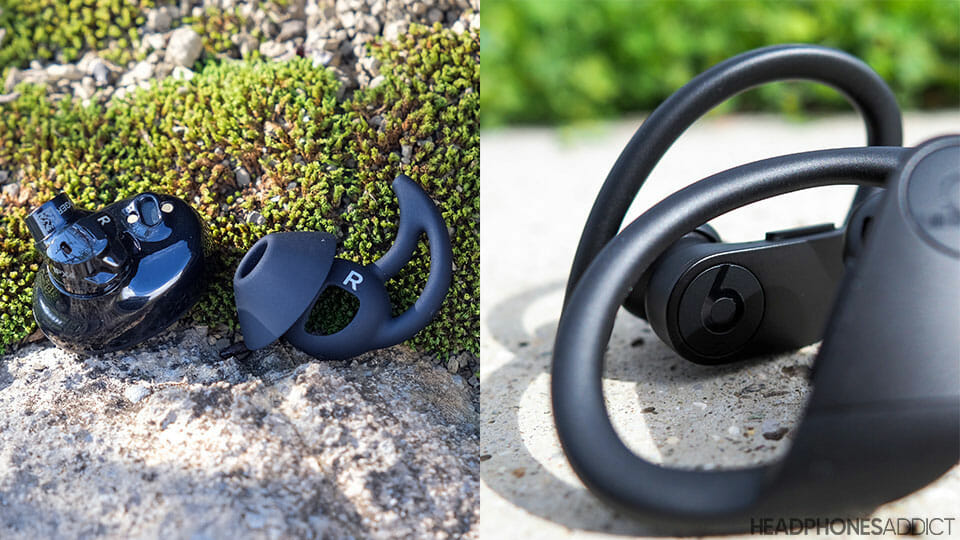
Features
The amount of features present on both is about the same. Bose Earbuds do come with an app, but it offers very little (at the moment Oct 2020).
PowerBeats Pro come without an app whatsoever. That means you have limited controls on Android. For example, you get a proximity sensor for an automatic play/pause feature that can’t be turned off even if you don’t want it.
But you get more features and options on an iPhone and other iOS devices. You can change some features but can’t EQ the sound like on AirPods.
Thankfully, controls are easy to get used to out of the box. They offer full control so that you don’t have to reach your smartphone too often.
There are dedicated volume controls on top of the housing. For other commands, you need to press the side button beneath the Beats logo. Actions are the same on both earbuds.
In contrast, you can connect Bose Sport Earbuds with a mobile app. In there, you can disable the proximity sensor and enable touch controls on your left earbud.
But there are very few actions to choose from, ranging from play/pause and summoning smart assistants. You can also skip a track but can’t rewind it. Sadly, you can’t remap any of these controls.
There are no EQ settings in Bose app, so you have to use third-party apps to tweak the sound. Hopefully, they add more features in the future.
Microphones work somewhat equally when used in the quiet room, although PowerBeats Pro sound less thin in comparison.
Similarities continue in a noisy environment, where both earbuds try to cancel out as much noise as possible, but start sounding a bit muffled in the process.
Bose Sport Earbuds mic test:
Sound
Excellent performance for sports on both sides, with similar sound signature and punchy bass.
Both earbuds are targeting the bass-loving audience. You get a fair amount of punchy low-end that packs a lot of control and detail.
It makes the overall sound quite warm and full. But the Beats still have more power and are one of the best bass earbuds.
Similarities continue even when it comes to the midrange. It’s slightly recessed on both, but vocals are a bit more present on Bose.

Whereas Sport Earbuds continues with a smooth transition into the treble, Beats Pro cranks up the high end of the spectrum. That distinctive V-shaped sound can get sibilant at times, which is something you don’t experience with Bose Sport Earbuds.
The soundstage is one area where Bose takes a few steps further. It’s surprisingly big for an in-ear headphone. Occasionally, you have to look around to make sure if that sound was really in the song or not. PowerBeats Pro’s staging isn’t as impressive.
All in all, Pro’s are better for pure bassheads, while Bose buds are a bit closer more subdued which works for more music genres.
Should You Buy Bose Sport Earbuds vs. Beats PowerBeats Pro?
Honestly, both models are great as workout earbuds. Both offer superb stability during movement, multipoint support, good microphones, and IPX4 sweat protection.
You should consider Beats PowerBeats Pro if you prefer a long-lasting battery, a more comprehensive array of onboard controls, a punchier, V-shaped sound, and you use an iPhone.
On the other hand, Bose Sport Earbuds are a better solution if you like a more laid-back sound and don’t want to use ear hooks. They can be irritating to some, especially for users with glasses.
Ultimately, there is a price difference. PowerBeats are still selling for $250, which seems high compared to the Sport Earbuds. You can get the latter for under $180.

From a childhood fascination with sound, Peter’s passion has evolved into a relentless pursuit of the finest headphones. He’s an audio expert with over 5 years of experience in testing both audiophile and consumer-grade headphones. Quote: “After many years, I can confidently tell which headphones are good and which are terrible.” Find his honest opinion in his reviews.


